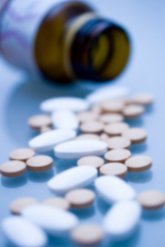 The death of Michael Jackson has highlighted the problem of toxicity of the drugs that people regularly take without a thought about the impact on their livers or immune systems.
The death of Michael Jackson has highlighted the problem of toxicity of the drugs that people regularly take without a thought about the impact on their livers or immune systems.
Many people regularly take over the counter (OTC) drugs like aspirin, ibuprofen or acetaminophen, the main ingredient in Tylenol, (known as paracetamol or Panadol in the UK) for colds or aches and pains without being aware of the dangers.
Virtually all drugs need to be detoxified by the liver and the side effects experienced by some is due to the damage caused directly buy the chemical to the liver or their effect on the metabolism of other drugs. Adverse side effects are experienced by 15 – 30% of those taking both over the counter medication and prescription medication.
Researchers have found that 8 million people (28% of all admissions) are hospitalized each year for conditions caused by prescription drugs. A frightening thought.
The liver detoxification tests that are used by some laboratories use aspirin and acetaminophen (paracetamol) as the agents to determine how the detox pathways are working. Drug companies who produce these drugs always study how the drug is detoxified so the way aspirin and acetaminophen are detoxified is well known.
The Two Step Detox Process
The liver converts drugs in a two step process called Phase 1 and Phase 2 pathways into substances that can be more easily excreted in the urine.
For most drugs the liver uses the route that will get rid of the chemical as rapidly and safely as possible. But in cases where the preferred pathway is not working efficiently often other pathways can be used with the danger that it is not eliminated so quickly or efficiently. The result here is that toxin stays in the system longer, may get turned into a more toxic form or may not get completely detoxified so it can cause damage to health.
Acetaminophen Detox
Acetaminophen (paracetamol) goes through several pathways which normally poses no problems if the person’s detox system is working efficiently and the drug is safely excreted. But if the Phase 2 pathway is not working as it should then the intermediate substance produced when it went through Phase 1 pathway builds up.
It then gets recycled through the Phase 1 pathway a second time where it becomes more toxic and can damage the liver. The danger lies in not enough glutathione being available to enable this dangerous toxin to be neutralized.
Acetaminophen is the number one cause of drug-induced acute liver failure in the United States. According to Dr Leo Galland there are people who develop liver disease from taking as little as 8 x 500 mg pills in a 24 hour period. Glutathione is plentiful in diets high in fruit and vegetables.
Aspirin Detox
Aspirin inhibits the Phase 2 detox pathway known as glucoronidation where glucoronic acid is attached to the toxin. Many prescribed drugs, hormones and food additives are detoxified through this route.
An irresponsible report in the The Daily Telegraph recently stated that an aspirin a day could help prevent liver damage caused by obesity, heavy drinking and drug use adding that “millions of people susceptible to liver problems could have their lives prolonged by the painkiller”.
The claims were based on a a study in mice found that aspirin lessened the damage caused by paracetamol overdose. Paracetamol overdose is entirely different from the fatty changes in the liver from alcohol or obesity and the NHS Knowledge Service states that “The results of this study do not suggest that people should start regularly taking aspirin in the hope of warding off liver damage”.
Non Steroidal Anti-Inflammatory Drugs
Non steroidal anti-inflammatory drugs (NSAID’s) like Diclofenac (Voltaren), inhibit the Phase 2 pathway known as sulfation (sulphation) and have been frequently associated with liver injury. A newer class of NAID’s called COX-2 inhibitors have been associated with some liver dysfunction.
Vioxx and Bextra have been withdrawn from the market due to heart related problems leaving Celebrex as the commonly prescribed COX-2 inhibitor for arthritis.
Anti-Anxiety Drugs
Benzodiazepines (Librium, Valium, Prozac) frequently prescribed for anxiety and insomnia suppress Phase 1 detox in both the liver and the brain. Consequently elderly folk may get neurological problems because the liver is slow at breaking down the neurotransmitters that should be eliminated before they build up and become toxic.
Antihistamines, Cimetidine and some other stomach acid secretion blocking agents also inhibit the Phase 1 detox system.
The liver detox pathways are adversely affected by a number of things including lack of specific nutrients, poor diet, excess alcohol, excess caffeine, toxins absorbed from the intestinal tract, certain prescription drugs and a genetic tendency.
Detox pathways can be improved
Fortunately the detox pathways can be improved with a diet and supplements high in the nutrients needed for liver detox. Researchers have shown that the detox pathways can be improved by taking vitamins, minerals and antioxidants to improve the detoxification of chemicals and pollutants.
If doctors did liver detox tests on their patients to see the efficiency of a person’s detox pathways before prescribing drugs then health practitioners believe that many adverse drug reactions could be prevented. The person’s detox pathways could be revved up with the appropriate diet and supplements.
You can learn more about your liver detox through the Detoxification Profile through Genova Diagnostics and Genova Europe. You can find a health practitioner in your area on their website.



